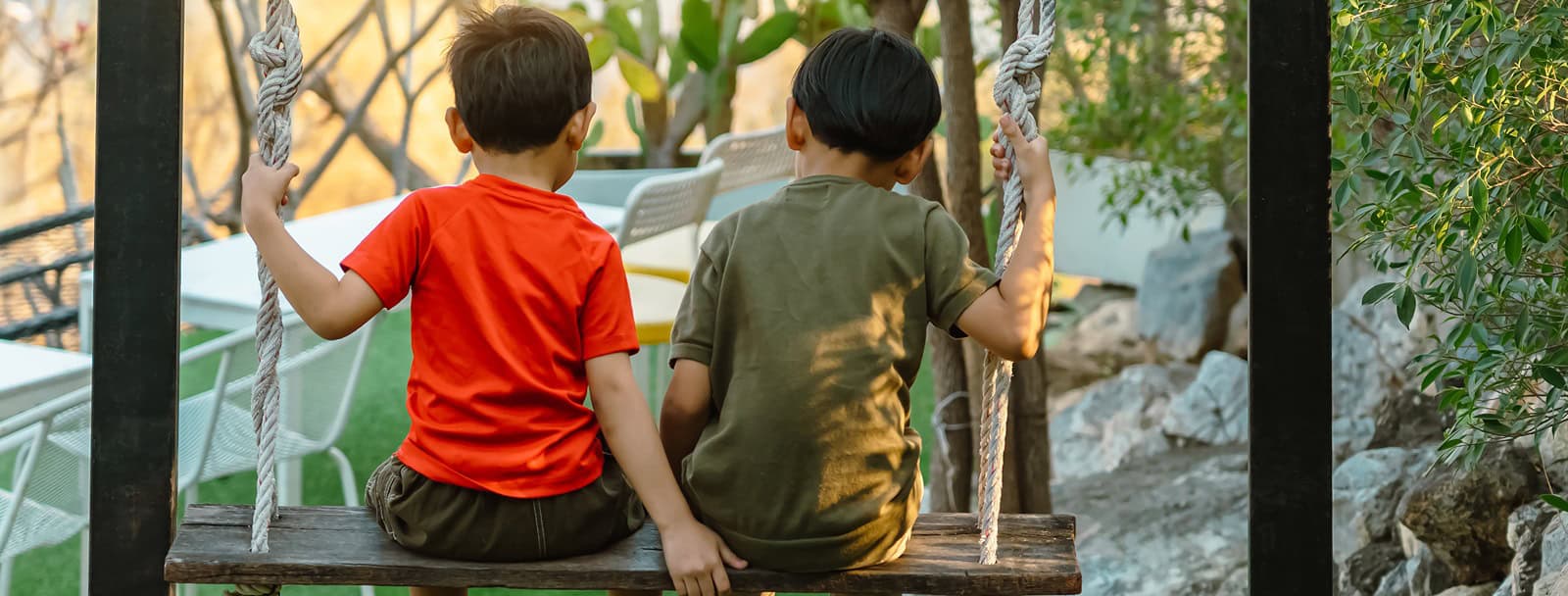Listen To This Page:
Quick Navigation:
- Arizona’s Legal Definition of Custody and Parenting Time
- Do Siblings Have a Legal Right to Stay Together in Arizona?
- When Courts Might Separate Siblings in Custody Cases
- How the Best Interests Standard Applies to Siblings
- Sibling Rights in Foster Care and Dependency Cases
- FAQs About Sibling Rights in Arizona Custody Cases
- Takeaways About Sibling Rights in Custody
- Contact a Family Law Attorney at CHM Law
When families separate, it’s not just the parents and children whose lives change—siblings often feel the impact too. In many Arizona child custody cases, a common question arises: do siblings have legal rights to remain together, and can a judge separate them?
Arizona law focuses heavily on the “best interests of the child,” and this includes maintaining healthy sibling relationships when possible. However, the courts also look at each child individually, especially if their circumstances, ages, or parental attachments differ.
At CHM Law, we know how important the bond between siblings can be. Whether you’re facing divorce, legal separation, or a custody dispute involving blended families or half-siblings, it’s important to understand how Arizona courts view sibling rights and what role they play in custody decisions.
Get Immediate Help from Our Family Law Attorneys.
We are Available to Talk Now.
Or, Continue Reading Below About:
What Rights Do Siblings Have in Arizona Child Custody Cases?
Arizona’s Legal Definition of Custody and Parenting Time
Arizona law doesn’t use the term “custody” in the traditional sense anymore. Instead, the courts refer to two separate legal concepts:
- Legal Decision-Making Authority: The right to make important decisions about a child’s health care, education, and religious upbringing.
- Parenting Time: The time a child spends in the care of each parent.
Under Arizona Revised Statutes (A.R.S.) § 25-403, courts must consider a range of factors when awarding legal decision-making and parenting time. While this statute focuses mainly on parent-child relationships, sibling relationships may influence the final custody arrangement—especially if separation would disrupt a child’s emotional well-being.
Do Siblings Have a Legal Right to Stay Together in Arizona?
There is no explicit statute in Arizona that guarantees siblings must be placed together during a custody dispute. However, judges do recognize the importance of sibling relationships and often try to keep siblings together when it serves their best interests. In custody disputes between parents, the court typically prefers joint arrangements that minimize disruptions to the children’s routines. That includes their sibling bonds. Keeping siblings together can provide emotional stability, especially during difficult transitions like divorce or relocation.
In fact, A.R.S. § 25-403(A)(2) allows the court to consider “the interaction and interrelationship of the child with the child’s parent or parents, the child’s siblings, and any other person who may significantly affect the child’s best interest.”
So while siblings may not have an enforceable “right” to stay together, their relationship is a key factor courts consider when determining legal decision-making and parenting time.
When Courts Might Separate Siblings in Custody Cases
Though courts aim to preserve sibling bonds, there are circumstances where siblings may be separated. These decisions are never taken lightly and typically involve compelling reasons.
Situations Where Separation Might Occur:
- Age and Developmental Needs: Courts may find that older siblings require a different living environment than younger ones.
- Different Parental Bonds: One child may have a stronger or safer bond with one parent, especially in cases involving past abuse or neglect.
- Special Medical or Educational Needs: A child with unique medical conditions might benefit from living with the parent best equipped to provide proper care.
- Child’s Preferences: Older children (typically over age 12) may express a desire to live separately from their sibling if it better suits their needs or comfort.
Realistically, the court’s goal is not to break up sibling relationships but to place each child in the environment that best supports their physical, emotional, and developmental health.
How the Best Interests Standard Applies to Siblings
The guiding principle in any child custody case in Arizona is the “best interests of the child.” Courts evaluate numerous factors under A.R.S. § 25-403 to make this determination. Among those factors are the child’s relationships with parents, siblings, and others who play significant roles in their lives.
Here are some sibling-related considerations judges may weigh:
- Are the siblings emotionally bonded and accustomed to living together?
- Would separating the siblings cause stress or trauma to one or both?
- Is one sibling acting as a caretaker or emotional anchor for the other?
- Are both siblings safe and thriving in the same household?
In many cases, separating siblings may negatively impact their adjustment to a new family structure. Judges are aware of this and generally try to avoid it unless another factor outweighs the benefit of keeping them together.
Sibling Rights in Foster Care and Dependency Cases
Sibling rights become even more pronounced in Arizona’s dependency or foster care system. When the Department of Child Safety (DCS) becomes involved, different legal standards apply—but preserving sibling relationships is a strong goal of Arizona child welfare policy.
Under A.R.S. § 8-513, the DCS must make reasonable efforts to place siblings together when they are removed from the home. If this is not possible, DCS must facilitate ongoing visitation or communication between separated siblings, provided it is safe and in the children’s best interests.
FAQs About Sibling Rights in Arizona Custody Cases
⑴ Can siblings choose to stay together in custody decisions?
In some cases, older siblings (age 12 and up) may express a preference to the court. Judges may consider this when forming a custody order, but it’s not the sole deciding factor.
⑵ Can one sibling testify on behalf of another?
Yes, with the court’s discretion, a sibling may provide testimony or make a statement if it helps the judge understand family dynamics. This is more common with teenage siblings.
⑶ What happens if stepparents or half-siblings are involved?
The court evaluates all relationships individually. Even half-siblings may be considered essential to a child’s well-being, especially if they have grown up in the same household.
⑷ Is it possible to modify custody to reunite siblings?
Yes. If circumstances change and a previous custody arrangement separating siblings no longer serves their best interests, a parent can file a petition to modify parenting time under A.R.S. § 25-411.
⑸ Are there legal remedies if DCS separates siblings in foster care?
A guardian ad litem or attorney may advocate for the siblings to be reunited. Parents or interested parties can also request a court review.
Takeaways About Sibling Rights in Custody
- Arizona courts do not guarantee siblings must stay together, but their relationships are heavily considered under the best interest standard.
- A.R.S. § 25-403 and § 8-513 both play roles in sibling placement decisions, especially in custody and foster care cases.
- Judges may separate siblings when necessary for safety, health, or developmental needs.
- Children over 12 may express a preference to live with or apart from their siblings.
- Custody decisions involving siblings are fact-specific and can often be revisited if circumstances change.
Contact a Family Law Attorney at CHM Law
Sibling relationships can be a strong source of comfort for children going through divorce or custody disputes. At CHM Law, we work to protect those bonds while advocating for outcomes that prioritize your child’s well-being. Whether you’re a parent concerned about your children being separated or you’re navigating a blended family situation, our legal team can help you understand your rights and legal options.
Our attorneys have helped families throughout Maricopa and Pinal Counties with every aspect of child custody, including complex cases involving sibling placement. We offer free one-on-one consultations and will take the time to understand your family’s unique situation before recommending a strategy.
Call CHM Law today at (602) 825-2500 or fill out our contact form to schedule a consultation. Let us help you protect your children’s relationships—and your peace of mind.

Attorney Darin Colburn has experienced first-hand just how difficult going through a family law matter such as divorce is when his parents divorced when he was 6 years old. Twenty years later, he has devoted his entire legal career to helping those facing similar issues. Darin attended the University of Arizona and graduated Cum Laude from the Eller College of Management. Darin is an experienced trial attorney that excels in high-net-worth divorce, complex business valuations, and messy child custody disputes.
Always Available 24/7 for Legal Help
Schedule an Appointment Today!
Call Us Now to Speak with an Attorney (602) 825-2500
Real Client Reviews
Below are just a few of what our clients have to say!









